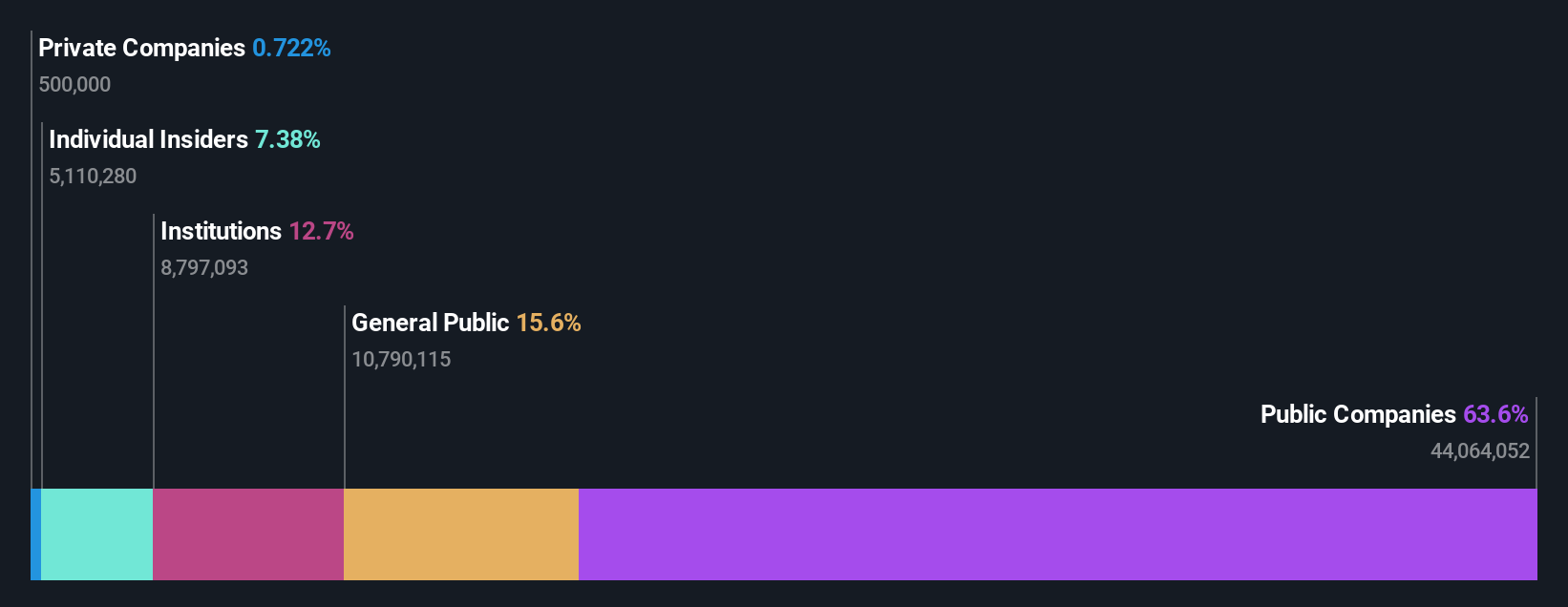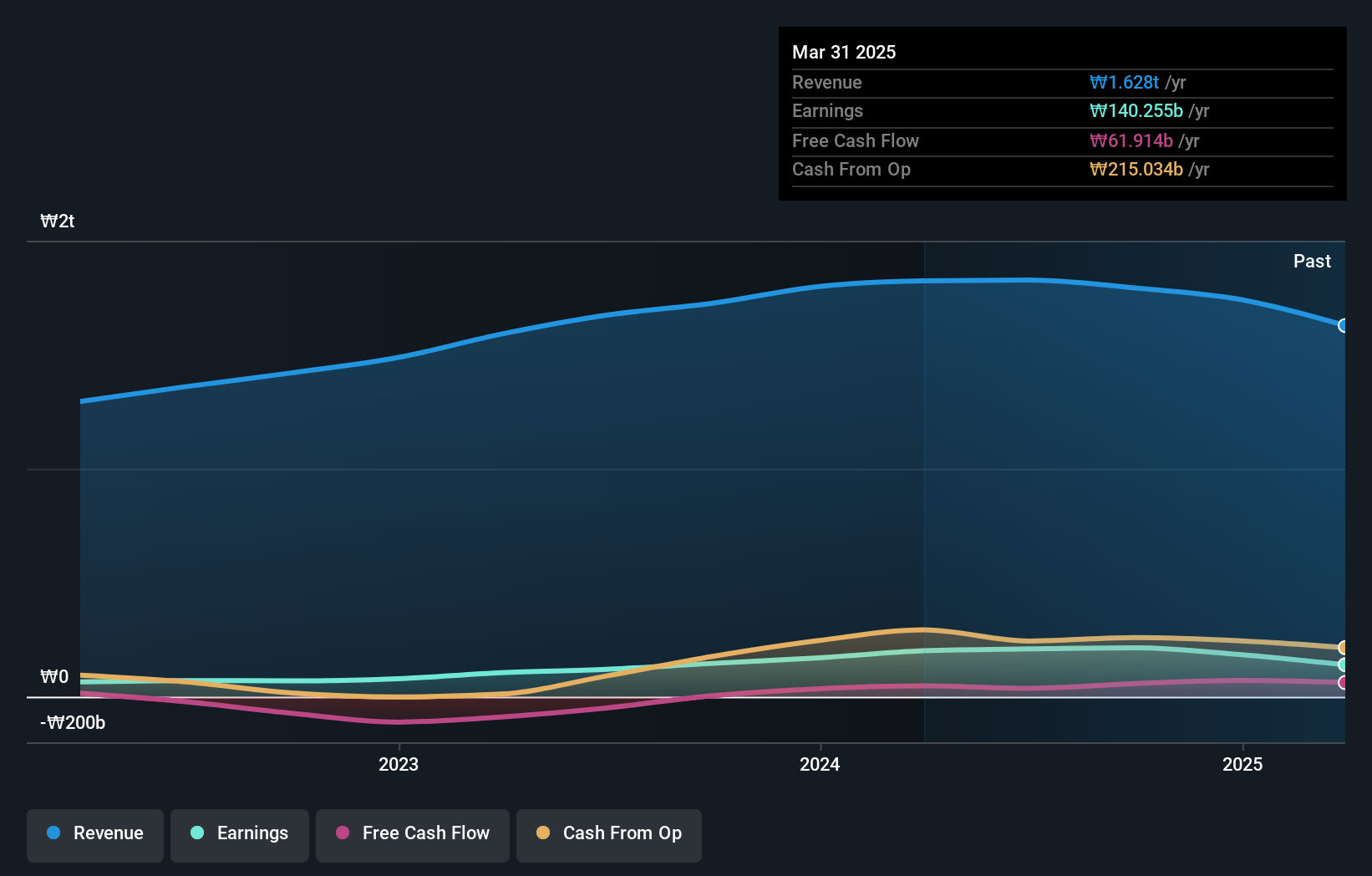- South Korea
- /
- Basic Materials
- /
- KOSE:A300720
Hanil Cement Co., Ltd.'s (KRX:300720) largest shareholders are public companies who were rewarded as market cap surged ₩89b last week
Key Insights
- Hanil Cement's significant public companies ownership suggests that the key decisions are influenced by shareholders from the larger public
- 64% of the company is held by a single shareholder (Hanil Holdings Co., Ltd.)
- Institutions own 13% of Hanil Cement
Every investor in Hanil Cement Co., Ltd. (KRX:300720) should be aware of the most powerful shareholder groups. The group holding the most number of shares in the company, around 64% to be precise, is public companies. In other words, the group stands to gain the most (or lose the most) from their investment into the company.
Clearly, public companies benefitted the most after the company's market cap rose by ₩89b last week.
In the chart below, we zoom in on the different ownership groups of Hanil Cement.
View our latest analysis for Hanil Cement

What Does The Institutional Ownership Tell Us About Hanil Cement?
Many institutions measure their performance against an index that approximates the local market. So they usually pay more attention to companies that are included in major indices.
As you can see, institutional investors have a fair amount of stake in Hanil Cement. This suggests some credibility amongst professional investors. But we can't rely on that fact alone since institutions make bad investments sometimes, just like everyone does. It is not uncommon to see a big share price drop if two large institutional investors try to sell out of a stock at the same time. So it is worth checking the past earnings trajectory of Hanil Cement, (below). Of course, keep in mind that there are other factors to consider, too.

Hedge funds don't have many shares in Hanil Cement. Our data shows that Hanil Holdings Co., Ltd. is the largest shareholder with 64% of shares outstanding. With such a huge stake in the ownership, we infer that they have significant control of the future of the company. For context, the second largest shareholder holds about 5.0% of the shares outstanding, followed by an ownership of 4.3% by the third-largest shareholder.
Researching institutional ownership is a good way to gauge and filter a stock's expected performance. The same can be achieved by studying analyst sentiments. We're not picking up on any analyst coverage of the stock at the moment, so the company is unlikely to be widely held.
Insider Ownership Of Hanil Cement
The definition of company insiders can be subjective and does vary between jurisdictions. Our data reflects individual insiders, capturing board members at the very least. The company management answer to the board and the latter should represent the interests of shareholders. Notably, sometimes top-level managers are on the board themselves.
Insider ownership is positive when it signals leadership are thinking like the true owners of the company. However, high insider ownership can also give immense power to a small group within the company. This can be negative in some circumstances.
We can see that insiders own shares in Hanil Cement Co., Ltd.. It has a market capitalization of just ₩1.3t, and insiders have ₩100b worth of shares, in their own names. Some would say this shows alignment of interests between shareholders and the board. But it might be worth checking if those insiders have been selling.
General Public Ownership
With a 16% ownership, the general public, mostly comprising of individual investors, have some degree of sway over Hanil Cement. While this size of ownership may not be enough to sway a policy decision in their favour, they can still make a collective impact on company policies.
Public Company Ownership
Public companies currently own 64% of Hanil Cement stock. This may be a strategic interest and the two companies may have related business interests. It could be that they have de-merged. This holding is probably worth investigating further.
Next Steps:
It's always worth thinking about the different groups who own shares in a company. But to understand Hanil Cement better, we need to consider many other factors. Consider risks, for instance. Every company has them, and we've spotted 1 warning sign for Hanil Cement you should know about.
Of course this may not be the best stock to buy. Therefore, you may wish to see our free collection of interesting prospects boasting favorable financials.
NB: Figures in this article are calculated using data from the last twelve months, which refer to the 12-month period ending on the last date of the month the financial statement is dated. This may not be consistent with full year annual report figures.
Valuation is complex, but we're here to simplify it.
Discover if Hanil Cement might be undervalued or overvalued with our detailed analysis, featuring fair value estimates, potential risks, dividends, insider trades, and its financial condition.
Access Free AnalysisHave feedback on this article? Concerned about the content? Get in touch with us directly. Alternatively, email editorial-team (at) simplywallst.com.
This article by Simply Wall St is general in nature. We provide commentary based on historical data and analyst forecasts only using an unbiased methodology and our articles are not intended to be financial advice. It does not constitute a recommendation to buy or sell any stock, and does not take account of your objectives, or your financial situation. We aim to bring you long-term focused analysis driven by fundamental data. Note that our analysis may not factor in the latest price-sensitive company announcements or qualitative material. Simply Wall St has no position in any stocks mentioned.
About KOSE:A300720
Hanil Cement
Produces and sells cements, ready-mixed concretes, and admixtures.
Excellent balance sheet second-rate dividend payer.
Market Insights
Community Narratives



